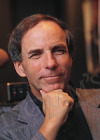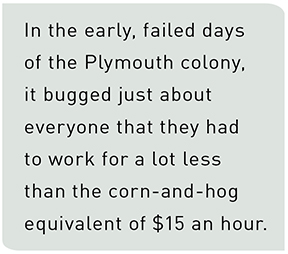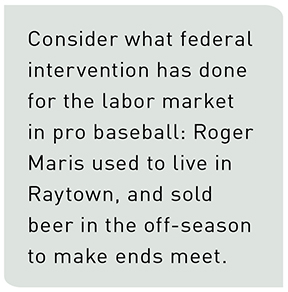HOME | ABOUT US | MEDIA KIT | CONTACT US | INQUIRE
HOME | ABOUT US | MEDIA KIT | CONTACT US | INQUIRE
 */?>
*/?>
I had just read an article about the “CEO-worker pay gap” when I noticed a post on Facebook with the simple message, “Call me crazy, but I love to see other people happy and succeeding.”
Said I to myself, “Cast me among the crazies.” Thomas Frank certainly did. In his inexplicable bestseller, What’s the Matter with Kansas, he described me as having a “drooling admiration for the very rich.” I do not think he meant it as a compliment.
Not surprisingly, Frank missed the point. He misses many. In fact, he misses them for a living. Truth be told, I have a drooling admiration for no one, at least not since Megyn Kelly turned RINO, but I do like to see other people happy and succeeding. Of course, not everyone rich has succeeded, and not everyone who is successful has become rich.
One who has done both is Cerner CEO Neal Patterson. He is among those singled out in an exhaustive study by Glassdoor Economic Research for making 102 times per year more than his average employee. Apparently, Patterson earns $6.6 million while his workers struggle earn an average of $65,000 per year.
Although Glassdoor has no real agenda beyond corporate transparency, its research is grist for the nation’s thriving grievance mills. These mills feed the many and hungry grudges across the fruited plain. There are those who begrudge men their pay gap, those who begrudge whites their net wealth gap, those who begrudge their Scrooge of a boss the $15 per hour he should be paying them but is not.

The rallying cry for all these groups is “inequality.” It truly irks them that some people have more than others—especially if those others include themselves. Without saying so in as many words, they embrace the inevitably lethal Marxist notion, “From each according to his ability, to each according to his need.”
Among the many things Karl Marx did not understand was America. From what he gathered, ours was “pre-eminently the country of religiosity,” and yet we seemed to be the one nation that had been most thoroughly corrupted by the commercial spirit.
The free inhabitant of New England, Marx wrote, was convinced he had “no other destiny here below than to become richer than his neighbor.” When the American traveled, Marx continued, he worried “only of interest and profit.” The world for the New England Yankee was “no more than a Stock Exchange.” As to idols, he had but one, and that, of course, was mammon.
One sees in Marx’s rant a precocious anti-Americanism that would deform the thinking of the “equality” crowd for the next 165 years and too often find a home in collegiate economics departments. What Marx almost assuredly did not know was that 200 years earlier, the very first New Englanders had taken a serious stab at the social scheme he was in the process of formulating.
Plymouth governor William Bradford wrote a masterful description of how that scheme went south on the old plantation and in a hurry. His memoir should be required reading for everyone entering the work force. As Bradford described it, the Puritans got it into their collective skulls that ridding themselves of private property and sharing their wealth “would make them happy and flourishing; as if they were wiser than God.”
It did not quite work out as planned. It never does. The scheme bred “confusion and discontent” and discouraged “much employment that would have been to their benefit and comfort.”
It bugged the young and able that they had to support older people. It bugged the productive that they got no more for their work than the unproductive. And it bugged just about everyone that they had to work for a whole lot less than the corn-and-hog equivalent of $15 an hour.
This unholy enterprise eroded the Puritans’ respect for each other and frayed their relation to God. “Seeing all men have this corruption in them,” said Bradford of the urge to succeed, “God in His wisdom saw another course fitter for them.” That course was free enterprise and private property.
Freed from the theoretical, Americans set about creating a distinctive and largely spontaneous commercial culture. Self-interest would drive it and self-control would restrain it. The Judeo-Christian legacy would inform that self-control and inspire it, but always imperfectly, given the fallen nature of man.

The relative absence of external control would allow this dynamic to work itself out and, in the process, forge the most productive industrial enterprise in world history, Cerner being a case in point. Founded just 35 years ago by Patterson, Paul Gorup and Cliff Illig, the company now employs 22,000 people worldwide, more than 10,000 of them here in Kansas City.
At $65,000 a year, those employees can stay as cool in the summer, as warm in the winter, and as well fed all day long as Patterson. They can drive to work in their own cars, watch the biggest screen TV Walmart sells, and imbibe in fine wines just as often as anyone in the Cerner C-suites. I suspect Patterson takes better vacations, but he deserves them—he did, after all, start the company.
To put things in perspective, there are 10 players on the Kansas City Royals who make more per year than Patterson. Pitcher Johnny Cueto makes more, and he has won two games so far this year. Omar Infante makes more, and he is batting .219.
These players owe their excessive salaries in part to their skills, but in larger part to government intervention in the baseball labor market. Before that intervention, players used to make good money but not crazy money. Hell, Roger Maris lived in Raytown and sold beer in the off-season, and he did not charge $10 or more a can, as they do at the K these days to pay Omar Infante.
Now just everyone and his brother clamors for government intervention: to raise the minimum wage or to equalize the salary between men and women or to set aside contracts for women and minorities.
If you’re not given to critical thinking, such progressive gestures sound fair. But do-gooders beware: Progressives “progress.” It is in their nature. And the final stage of that progress is inevitably the gulag, where everyone makes the same amount, which is nothing.